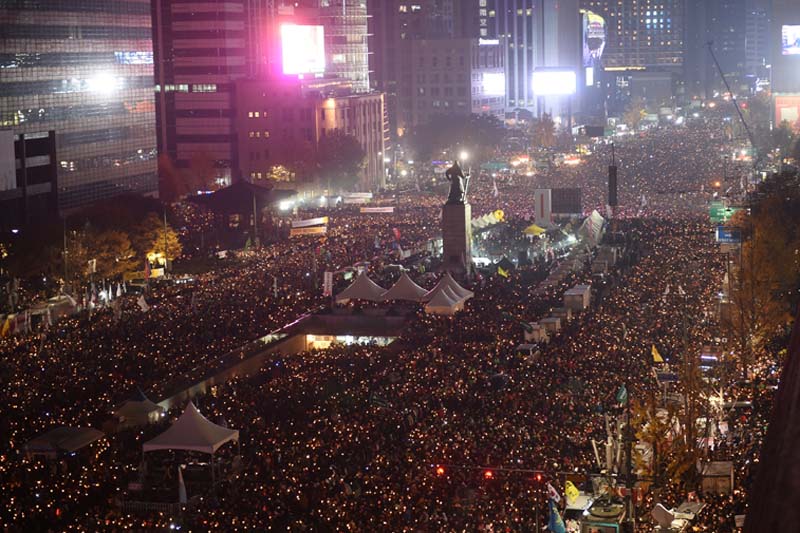Power vacuum weighs on South Korea as Park fights for survival
SEOUL: As the chorus grows louder for South Korean President Park Geun-hye to resign over a corruption scandal, a power vacuum is weighing on her administration, leaving her political survival in doubt and its vulnerable economy exposed to political shocks.
South Korean opposition political parties said this week they will review strategies to impeach Park after prosecutors said she was an accomplice in the corruption scandal.
Park's close friend and a former presidential aide were indicted on Sunday for abuse of power for pressuring big businesses to contribute funds to foundations at the centre of the scandal.
"Based on the consensus that President Park is the centre of the abuse of power scandal, the best course of action to minimise the vacuum in government and to restore constitutional rule is for her to step down," the leaders of three opposition parties said in a joint statement on Sunday.
Park has all but ceased public activities as president and has withdrawn to the secluded Blue House compound at the foothill of the rocky Mount Bugak in Seoul. On 12 of the 16 working days this month, she took part in no scheduled events.
She held a previously arranged summit with Kazakh President Nursultan Nazarbayev on November 10 but has not had a public event outside the Blue House since November 8, when she visited parliament offering to relinquish some of her powers in office to placate lawmakers.
The risk of a presidential impeachment in the democratic South, along with North Korea's nuclear threat, have turned the Korean peninsula into Asia's biggest unknown for global investors, Belinda Boa, Head of Active Investments for Asia Pacific at BlackRock, told Reuters in an interview on Monday.
Missing at APEC
Park was notably absent at the meeting of 21 Asia Pacific leaders in Lima at the weekend, where free trade and a fight against protectionism were the key topics under the looming US presidency of Donald Trump, who has already said he would scrap the Trans-Pacific Partnership trade pact.
Half of South Korea's GDP comes from exports so it is vulnerable to more protectionist US trade policy pledged by Trump.
Prime Minister Hwang Kyo-ahn, who attended the Pacific Rim summit on Park's behalf briefly met the host, Peruvian President Pedro Pablo Kuczynski but held no bilateral meetings with world leaders, who use the occasion to deepen bilateral ties.
It was the first time a leader of South Korea, which is a founding member, has not attended the APEC summit. The prime minister is largely a figurehead appointee tasked with overseeing the cabinet on domestic issues.
Park also missed the cabinet meeting on Tuesday, extending her absence since October 11 when she last led the meeting she normally chairs every two weeks. It was instead chaired by the finance minister, who is on the way out. Little has been done on replacements nominated for three cabinet positions, including the to finance job.
"She is likely to be doing her job that she can do on her own, as long as it's something that requires the least contact with the public," said Kim Jun-seok, professor of political science at Dongguk University in Seoul.
"But she won't be able to bring any new legal initiative or raise a new policy agenda," Kim said.
Park's five-year term runs to February 2018.
Her sparse official schedule in November is in contrast to the busy month she had a year ago, including a three-way summit with the leaders of China and Japan, a separate summit with Icelandic president, four major policy conferences and two cabinet meetings.
Park's office has said she intends to fulfil her duties as president and has not formally acknowledged the calls from the public and parliament for her to step down or race impeachment.
She still intends to attend the three-way North Asia summit if this year's host, Japan, confirms the date, the foreign ministry has said.
But it was unclear if Park can continue to represent the country diplomatically when other countries might be ambivalent about scheduling summit meetings with her.
"Diplomatically this crisis is known around the world so the country's reputation has been hurt and that is a problem diplomatically," Ha Kyung-chull, a former judge on the Constitutional Court, told Reuters.
"Both domestically and diplomatically, you have to say rule by the president of government affairs is quite difficult."
Some of her closest advisers said privately that they hope if she can ride out the next few weeks, she will be able to survive the crisis as public sentiment cooled and more people chose to avoid the turmoil of a premature end to her presidency.






